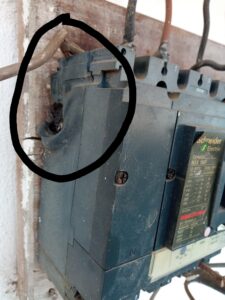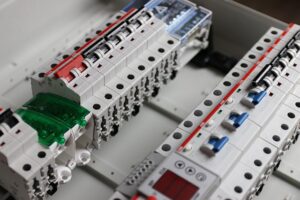Breakers are a vital component of our electrical systems, protecting our homes and appliances from overloads and short circuits.
However, over time, breakers can develop faults, causing a range of problems. In this article, we will discuss the symptoms of bad breakers, their causes, and what to do about them.
Table of Contents
Symptoms of Bad Breakers:
Tripping frequently:
One of the most common symptoms of a bad breaker is frequently tripping. If your breaker trips frequently, it means it is not functioning correctly and may need replacement.
Burning smell:

A burning smell around the breaker panel is an indication that something is wrong. It could be a sign of overheating, damaged wires, or a faulty breaker.
Buzzing sound:
If you hear a buzzing sound coming from the breaker panel, it may be a sign of a bad breaker. This sound may be an indication of loose or damaged wires, which can cause overheating and potentially lead to a fire.
Flickering lights:
A bad breaker can cause your lights to flicker or dim. This is because the breaker is not providing a consistent and steady flow of electricity to your home.
Electrical shock:
If you experience an electrical shock when touching an appliance, it could be a sign of a bad breaker. This is because a faulty breaker may not trip when it should, allowing too much electricity to flow through the circuit.
power loss while the breaker:
Experiencing power loss while the breaker is on is another symptom of a bad breaker. When a breaker is tripped or faulty, it can cause a circuit to lose power, even if the breaker appears to be on. In some cases, a breaker may be partially tripped, causing intermittent power loss or voltage fluctuations.
If you are experiencing power loss while the breaker is on, the first step is to check the breaker panel to see if any breakers have tripped.
Too hot to the touch:
a circuit breaker that becomes too hot to the touch is another sign of a bad breaker. When a circuit is overloaded, the breaker can heat up and trip to prevent damage to the electrical system. However, if a circuit breaker is consistently overheating, it could be a sign of a larger problem, such as a faulty breaker or an overloaded circuit.
If you notice that a circuit breaker is getting too hot, it is important to take action immediately. Turn off the power to the circuit and contact a licensed electrician to assess the situation. Continuing to use an overheating breaker could lead to a fire or other serious electrical problem.
Causes of Bad Breakers:
- Overloaded circuits: An overloaded circuit can cause a breaker to trip frequently, which can cause wear and tear on the breaker over time.
- Age: Breakers have a lifespan of around 30 years. If your breaker is old, it may be time to replace it.
- Loose or damaged wires: Loose or damaged wires can cause a breaker to malfunction and potentially lead to a fire.
- Power surges: Power surges can cause a lot of stress on a breaker and may cause it to fail.
- Environmental factors: Electrical systems can be impacted by environmental factors such as temperature, humidity, and exposure to water or moisture. These factors can cause breakers to become corroded or damaged over time.
- Poor installation or maintenance: Improper installation or maintenance of electrical components can lead to problems down the line, including faulty breakers.
- A short circuit is one of the most common causes of a bad breaker. When a short circuit occurs, it can cause the circuit to overload and trip the breaker, or in some cases, damage the breaker and cause it to become faulty. Short circuits can occur for a variety of reasons, including damaged or frayed wiring, faulty appliances or equipment, or faulty electrical components. Read my comprehensive article Why is short circuit dangerous? for more information.
What to Do About Bad Breakers:
- Call an electrician: If you suspect you have a bad breaker, the best thing to do is call an electrician. They will be able to diagnose the problem and recommend the best course of action.
- Replace the breaker: If the electrician determines that the breaker is faulty, they will likely recommend replacing it.
- Upgrade your electrical system: If you have an old electrical system, upgrading it may be the best course of action to prevent future problems with your breakers.
Comparison Table:
| Symptom | Possible Cause |
|---|---|
| Circuit breaker trips often | Overloaded circuit |
| Short circuit | |
| Faulty breaker | |
| Ground fault | |
| Burning smell | Overloaded circuit |
| Faulty breaker | |
| Damaged or faulty wiring | |
| Buzzing sound | Loose wiring or connections |
| Faulty breaker | |
| Flickering lights | Overloaded circuit |
| Faulty breaker | |
| Damaged or faulty wiring | |
| Electrical shock | Faulty wiring or connections |
| Faulty breaker | |
| Power loss while breaker is on | Short circuit |
| Faulty breaker | |
| Overloaded circuit | |
| Environmental factors such as corrosion, humidity or age | |
| Poor installation or maintenance | |
| Too hot to the touch | Overloaded circuit |
| Environmental factors such as temperature or humidity | |
| Faulty breaker |
Note: These signs can indicate a serious electrical issue, and it’s important to turn off power to the circuit and contact a licensed electrician immediately for proper diagnosis and repair.
Conclusion:
If you suspect that your circuit breaker has gone bad, it’s important to take action to address the issue promptly. The first step is to turn off the power to your home to prevent any potential electric accidents or equipment damage.
Replacing a circuit breaker can be a tricky task and requires knowledge of electrical systems. If you have sufficient knowledge and experience in electrical work, it may be possible to replace the breaker on your own. However, if you’re not confident in your abilities or lack the necessary knowledge, it’s best to leave the job to a licensed electrician.
While DIY projects can be a great way to save money, attempting to replace a faulty breaker without the proper knowledge and tools can be dangerous. It’s important to prioritize your safety and the safety of your home and family by calling a certified electrician to handle the job.
In summary, turning off the power to your home and calling a certified electrician are the recommended steps to take if you suspect that your circuit breaker has gone bad. Only attempt to replace the breaker on your own if you have the necessary knowledge and experience in electrical work.
Additional Information:
It is important to note that working with electricity can be dangerous and should only be done by trained professionals. Attempting to fix electrical problems on your own can lead to injury or even death. Always call a licensed electrician if you suspect you have a problem with your electrical system.
In addition, it is essential to have regular maintenance and inspections of your electrical system to prevent problems before they occur. A licensed electrician can perform regular inspections and make any necessary repairs or upgrades to ensure your system is safe and functioning correctly.
Finally, it is essential to be aware of the electrical load your home is placing on your system. Overloading circuits can cause breakers to trip and potentially lead to more significant problems. Be mindful of the appliances and devices you are using and distribute the load evenly throughout your system.
In conclusion, recognizing the symptoms of bad breakers is vital for maintaining a safe and functional electrical system. By understanding the causes and taking action when necessary, you can prevent potential hazards and ensure your home is protected.
Don’t Leave Empty-Handed!
Install my Free Android App on Google Play:
Electrical Cables Most Common Tables “Cables Tables”
And, my Electrical Calculations App “Fast Electrical Calculator”
Discover more great content by subscribing to My channel
Looking to stay ahead of the game in the world of electrical engineering? Subscribe to my YouTube channel and gain access to exclusive content you won’t find anywhere else!
The staff I recommend
(Amazon Affiliate Links to products I believe are high quality):
- Economy 120 Volt/60Hz AC Power Source – Step-Down Voltage & Frequency Converters 1800W
- UNI-T Digital Multimeter Tester UT139C
- 50-Amp Extension Cord for RV “100ft”
- Voltage Stabilizer 110/220v
- Hair Dryer “best selling“
- TOSHIBA EM131A5C-BS Countertop Microwave Ovens
Disclaimer: This contains affiliate links to Amazon products. I may earn a commission for purchases made through these links.

